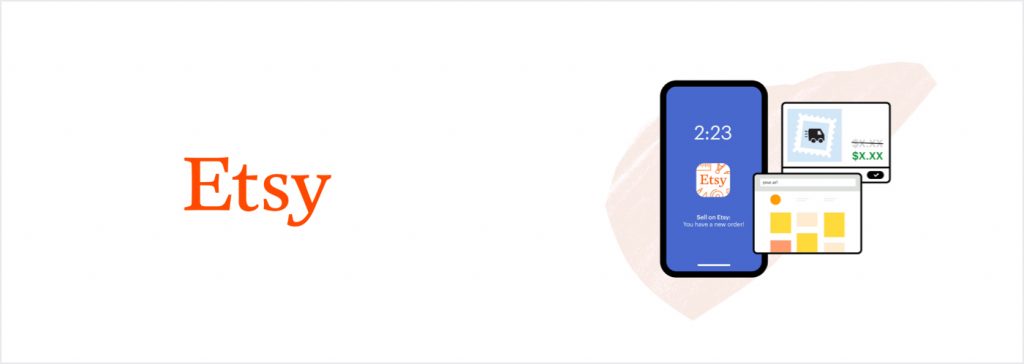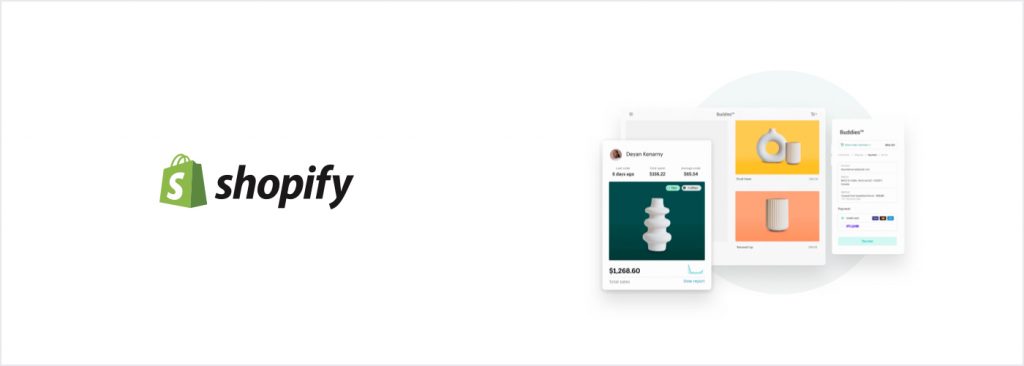Home › Shopify Fees vs. Etsy Fees: Which Platform Is The Least Expensive?
Shopify Fees vs. Etsy Fees: Which Platform Is The Least Expensive?
Deciding on an ecommerce platform based on fees can be challenging because each platform has its unique advantages. We’ll break down the fees associated with each platform and help you see which platform costs more.
Shopify and Etsy are both completely different ecommerce vehicles, so comparing them side-by-side isn’t exactly straightforward. Shopify is a software ecommerce tool that manages every part of your business online. Etsy is an online marketplace where both buyers and sellers come together to trade goods and services. Etsy also has Pattern, which is an ecommerce solution similar to Shopify. Both platforms have their unique advantages, so it’s essential to consider which platform best suits your business needs in the end. Or, maybe using both platforms can add more value to your bottom line? In this article, we’ll break down the costs of each platform and help you consider which one is right for your business.

Etsy Fees
Etsy Marketplace Fees
If you’re selling on Etsy, the main fees you’ll be required to pay are listing fees, transaction fees, and payment processing fees. However, some additional fees may vary depending on your business status and location, such as regulatory operating fees, VAT, and sales tax. In addition, there are other fees associated with add-ons like Etsy Ads and Etsy Plus.
Listing Fees
Etsy charges you $0.20 for each item you list for sale on Etsy.com, whether or not the item sells. Etsy.com listings expire after four months, and to renew them will cost you the full listing fee per item. This listing fee also goes for multiple quantities of the item, so after the first item sells, the listing will automatically renew, and you will be charged $0.20 each time the item sells.
Transaction Fees
You will be charged a transaction fee of 5% of the displayed price for each time your item sells through Etsy.com. This 5% transaction fee also applies to the amount you charge for shipping and gift wrapping services.
Payment Processing Fees
You will need to use Etsy Payments, which accepts various online payment forms such as credit cards, debit cards, gift cards, PayPal, Apple Pay, and Google Pay. All sales through Etsy Payments convert into your local currency. The fees will depend on your country; see here for a list of Etsy Payments fees associated with each country. In the United States, Etsy Payments’ fee is 3% of total order value (including shipping and tax) plus an additional $0.25. Etsy also charges a fixed deposit fee in some countries, so make sure you check out their payments policy if you’re selling internationally.
Etsy Plus Fees
If you’re serious about selling on Etsy, you’d probably need Etsy Plus to maximize your capabilities in the marketplace. Etsy Plus is a $10/month premium subscription plan that provides you added perks which include:
- Listing Credits: 15 listing credits/month
- Ad Credits: $5 in Etsy Ads credit/month
- Custom Web Address Discounts
- Restock Requests: Shoppers can sign up to receive alerts when sold-out items are in stock.
- Advanced Shop Customization: You can customize more with store banners, layouts, and featured items.
- Other Discounts: You can save some money on shipping boxes, business cards, and other printables.
Etsy Pattern Fees
Etsy Pattern is a subscription service that costs $15/month (Not including a custom domain name). Unlike Etsy.com you get unlimited listings and zero transaction fees exclusively with your website through Pattern. If you have product listings on both the marketplace and your website, each item is subject to Etsy.com fees if it sells through Etsy’s marketplace. There is still a payment processing fee with Etsy Payments on your website regardless. Pattern, by Etsy, is an ecommerce website development tool similar to Shopify. You can use Pattern to build a website unique to your brand with many customizable templates and personalization options. Unlike Etsy’s marketplace, you can sell items beyond just handmade, vintage, and craft goods when using Pattern. But, since your store will be an independent website, you’ll be responsible for driving your own website traffic. For merchants who use both Etsy’s marketplace and Pattern, cross management of your business on both platforms is easy to do in one central hub.
Etsy Pattern offers many tools to compete with Shopify, including:
- Business management tools
- Website analytics
- Payment processing
- SSL certificate
- Domain management
- Blogs and social media integration
- Email marketing with MailChimp
- Facebook Pixel
- SEO

Shopify Fees
Shopify Subscription Fees
Shopify offers three subscription-based plans to choose from, which are:
1) Basic: $29/month with
- Online credit card fee of 2.9% + $0.30
- In-person credit card fee of 2.7% + $0.00
- If not using Shopify Payments, a transaction fee of 2.0%
- Shipping discounts of up to 77% off
2) Shopify: $79/month with:
- Online credit card fee of 2.6% + $0.30
- In-person credit card fee of 2.5% + $0.00
- If not using Shopify Payments, a transaction fee of 1.0%
- Shipping discounts of up to 88% off
3) Advanced: $299/month with:
- Online credit card fee of 2.4% + $0.30
- In-person credit card fee of 2.4% + $0.00
- If not using Shopify Payments, a transaction fee of 0.5%
- Shipping discounts of up to 88% off
The additional fees vary with each plan, but of course, the most expensive plan has more benefits such as more staff accounts (up to 15), more inventory locations (up to 8 locations e.g., retail stores, warehouses, etc.), advanced reports, international pricing, international domains, and higher shipping discounts. Shopify also offers discounted prices when you pay for long-term plans upfront; 10% off on annual plans and 20% off on biennial plans. Not included in this comparison is Shopify Plus, which is an enterprise platform for higher volume businesses.
As you may know, Shopify is one of the top leaders in ecommerce platforms; currently, stores built on Shopify account for nearly 7.63% of the market share in ecommerce platforms with over 215,000 companies, almost double Amazon’s at 3.92%. One reason why Shopify is so popular is the nearly endless amounts of plugins and apps you can use to enhance your online store. Shopify has an app marketplace with over 4,000 apps to help you create and customize your site and customer experience. You should consider what capabilities you’ll need, then research the apps that provide the desired solution at the best price. Some apps are free, but can come with hidden fees to upgrade, so make sure you do your due diligence.
Which is Least Expensive?
To justify a pretty fair comparison between the two, we’d have to assume you’ll be using Etsy plus and Pattern since Shopify provides the features included in both of them, except for the Etsy.com marketplace. You’ll probably notice that Shopify has fewer fees. But let’s compare them side-by-side. Here’s a high-level overview of the comparison, assuming you’re selling online in the United States with the platform’s respective payment gateways.
Shopify
Basic Plan-
$0.00 Listing Fees
-
$0.00 Transaction Fees
-
2.9% + $0.30 Payment Processing
Etsy
Etsy Plus + Pattern-
$0.20/item Listing Fees
-
5% Transaction Fees
-
3% + $0.25 Payment Processing
Let’s say you sell a $50 item; if we look at the fees per transaction, selling Etsy would cost you $4.45, while Shopify would cost you just $1.75. Now, let’s say you sell 1 unit of a $50 item 100 times within one month, and you’re not even paying for Etsy Plus and Pattern. According to our calculation, with $5,000 in sales per month on Etsy, you’d pay a total of $445 in just fees alone, whereas, with Shopify, you’d pay $204, including the Basic Shopify subscription. However, that’s if you sell through Etsy.com.
If we were to compare Shopify’s basic plan to Etsy’s Pattern alone, Etsy’s Pattern fees would be less since there wouldn’t be any listing or transaction fees. If we were to use the same example of a $50 item sold 100 times in a month, Etsy Pattern would cost $190 while Shopify would cost a total of $204.
Shopify Costs Less
There’s a reason why many of the most successful brands like Heinz, Redbull, Gymshark, Allbirds, and Tesla use Shopify to power their ecommerce. All in, Shopify offers more for less with dozens of features designed to help you sell more at a lower cost. If you’re ready to launch your own custom Shopify store, let’s chat. We can get you live within 60 days with less than $5K down – Ask us about our Shopify Elevate offering.






